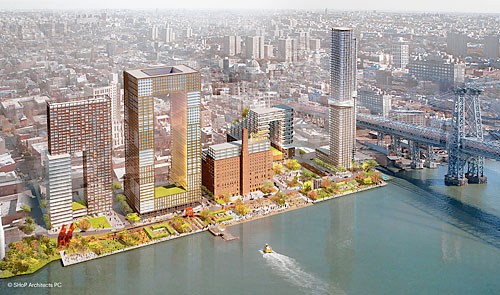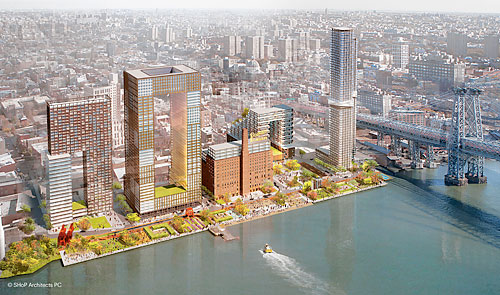
When the Jehovah’s Witnesses began putting its portfolio of 35 buildings on the block in 2004, even the most seasoned real estate observer couldn’t have predicted that one of the winning bidders of a sprawling six-building complex in Dumbo would be Aby Rosen.
Known primarily as the owner of the Seagram Building and Lever House, two of the most iconic examples of mid-century modernism in Manhattan, Mr. Rosen and RFR Realty seemed unlikely suitors for a 1.2 million-square-foot compound in Brooklyn.
But similar to his cultivation of private equity and hedge fund tenants prior to the economic collapse, Mr. Rosen once again is tapping into New York City’s most exciting new business community–the rapidly expanding tech sector in Brooklyn.
“You’re seeing a lot of start-ups–tech and creative–and that’s the result of the last five years where prices in Midtown South are going up substantially,” said Tom Conoscenti, director of commercial leasing at Two Trees, one of several companies that bid on the site earlier this year. “The tenant base has dramatically changed in the past 10 years.”
But Mr. Rosen isn’t the only nationally recognized real estate investor to have recently explored buying property across the East River. From Taconic Investment Partners, which also bid on the Watchtower property, to Midtown Equities, which the city tapped in September to redevelop seven adjoining 19th-century warehouses nearby, developers better known for projects in Manhattan–not to mentioned nationwide–are lining up to capitalize on Brooklyn’s burgeoning creative class and rising property values.
And while artists began migrating to Williamsburg, Greenpoint and other neighborhoods more than a decade ago, only recently have some of the country’s largest landlords entered a market dominated primarily by single-family owners and small-scale investors.
Despite perceived value in comparison to Manhattan, prices in Brooklyn have escalated, motivated in no small part by the borough’s increasing popularity with developers.
Land prices topped out at approximately $150 per square foot in Brooklyn prior to the market collapse–when 421-a tax exemptions were still prevalent, according to data from CPEX. Today, land in Williamsburg can sell for as much as $300 per square foot, with prices in Park Slope and Downtown Brooklyn reaching $250 and $175 per square foot.
Williamsburg, labeled an “appendage of Manhattan” by some, is largely credited as being the catalyst for Brooklyn’s emergence on the radar of developers.
“Brooklyn really came into its own through Williamsburg taking off coming out of the recession,” noted Kevin Davis, chief investment officer at Taconic, which recently developed residential housing in East New York and is currently seeking property in Williamsburg, among other areas of the borough. “That really put Brooklyn on the map.”
The growing potential for commercial space in Williamsburg is most evident in Two Trees Management’s acquisition of the former Domino Sugar Factory for $185 million last year. The company, better known for projects in Dumbo, has initiated a development plan that stands to triple the amount of office space in Williamsburg, housing between 3,000 and 4,000 office workers in more than 600,000 square feet of space.
Throughout Brooklyn, projects of interest run the gamut across residential, commercial and multifamily sectors, and it may not be long before a commercial ground-up development is pursued in Brooklyn, some analysts predict.
The six-building Watchtower portfolio, which sold to RFR in partnership with Kushner Companies for $375 million in July, has been earmarked as potential office space for tech companies as part of the Brooklyn Tech Coalition’s efforts to promote Brooklyn as a national tech hub.
“These properties feature large, creative office space right in the heart of the growing Brooklyn tech triangle,” said Jared Kushner, chief executive officer of Kushner Companies, in the statement at the time of the sale’s announcement. “We look forward to playing a key role in the continued improvement of the neighborhood and advancement of the market,”
Mr. Kusher owns the Observer Media Group, which publishes The Commercial Observer. Both Kushner Companies and RFR Realty declined to comment further on the deal.



